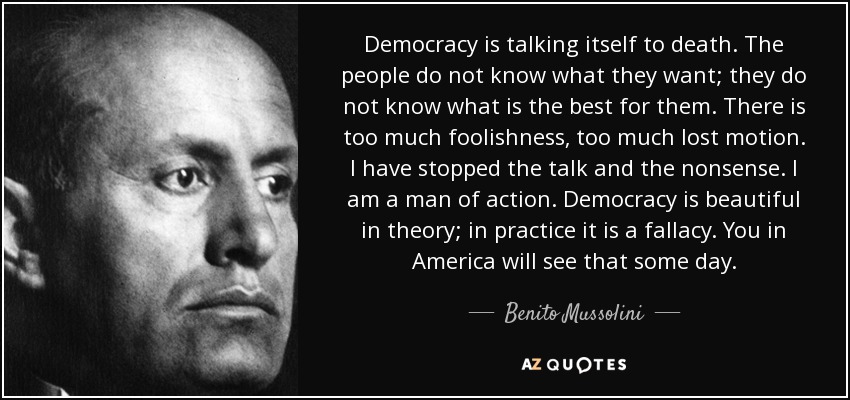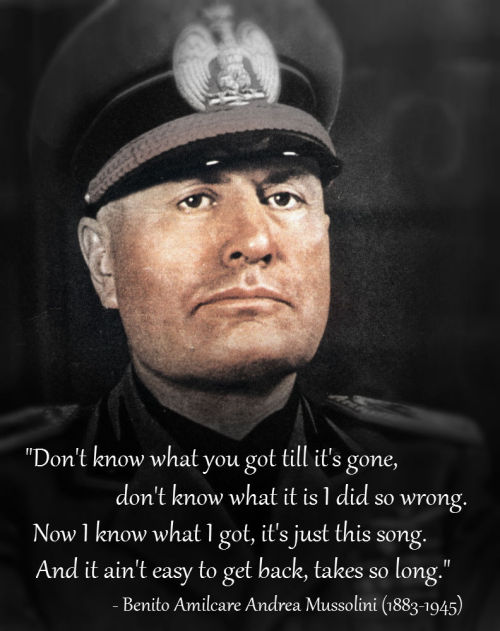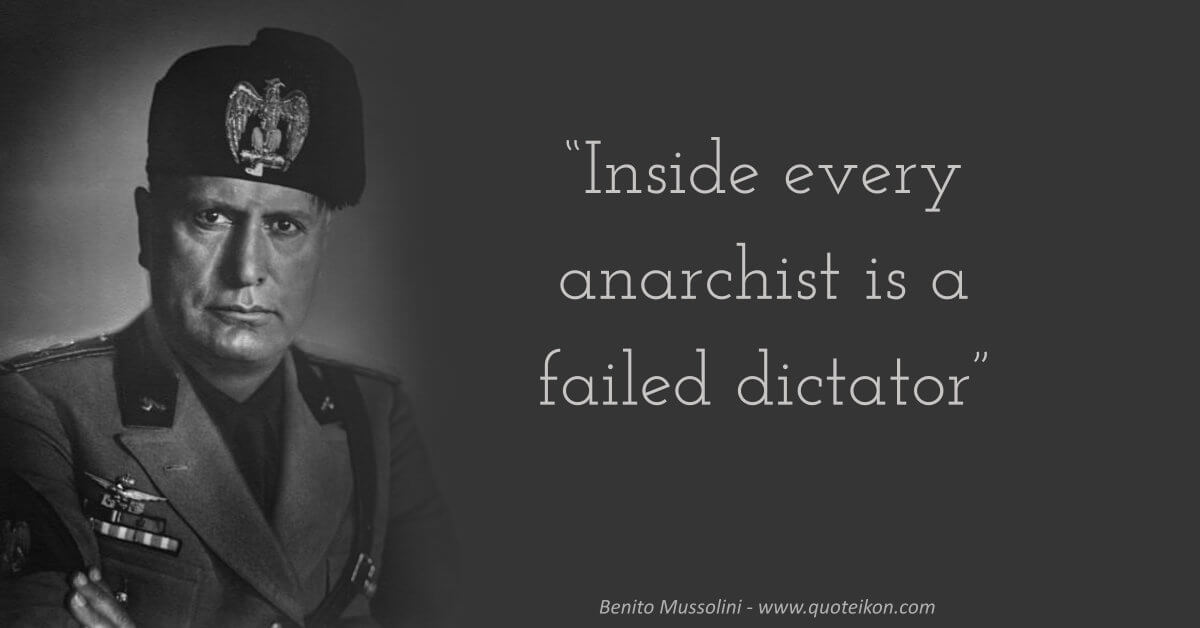Iz quotes
Table of Contents
Table of Contents
Benito Mussolini, commonly known as Il Duce, was an Italian politician and leader of the National Fascist Party. While controversial for his fascist and authoritarian policies, Mussolini’s quotes were powerful statements that continue to resonate with people today. In this article, we will explore some of his most notable quotes, their meanings, and their impact on society.
The Pain Points of Benito Mussolini Quotes
The mere mention of the name Benito Mussolini often evokes images of dictatorial rule, fascist ideology, and totalitarianism. His quotes are viewed by many as expressions of oppressive and dangerous beliefs that have caused great harm in the past. Nevertheless, it’s crucial to understand the context of his quotes and their significance in shaping his worldview.
The Target of Benito Mussolini Quotes
Mussolini’s quotes were aimed primarily at his followers and supporters. They served as rallying cries for the fascist movement and were meant to inspire nationalism, obedience, and devotion to the Italian nation. However, many of his quotes have been misinterpreted and taken out of context, causing controversy and debate for years to come.
Summary of Main Points
In summary, Benito Mussolini’s quotes have been a subject of intrigue, controversy, and debate for decades. They encapsulate his fascist worldview, his belief in nationalism and authoritarianism, and his vision of Italy as a dominant player on the world stage. While they may sound harsh and oppressive to modern ears, it’s essential to contextualize his quotes in the sociopolitical landscape of his time and understand their impact on Italian history and fascism as a whole.
Understanding “Every anarchist is a baffled dictator”
One of Mussolini’s most popular quotes is “Every anarchist is a baffled dictator.” This quote speaks to his belief that the underlying motive of anarchism is the desire for power and control, disguised as a pursuit of individual freedom. While many people might disagree with this perspective, it’s essential to remember that Mussolini himself was a dictator, and his ideology advocated for strong government control and centralization of power.
 It’s also worth noting that anarchism and fascism are fundamentally opposed ideologies, with the former advocating for decentralized power and the latter emphasizing authoritarianism. While Mussolini’s quote might seem like an attack on anarchism, it also serves as a reminder of the fundamental differences between these two opposing views of government and human nature.
It’s also worth noting that anarchism and fascism are fundamentally opposed ideologies, with the former advocating for decentralized power and the latter emphasizing authoritarianism. While Mussolini’s quote might seem like an attack on anarchism, it also serves as a reminder of the fundamental differences between these two opposing views of government and human nature.
Why “Democracy is talking itself to death” resonates today
Another one of Mussolini’s famous quotes is “Democracy is talking itself to death; the people do not know what they want. They do not know what is the best for them.” This quote, while controversial, resonates with many people today, who feel that democracy has become ineffective, corrupt, and unresponsive to the needs of ordinary citizens.
 However, it’s important to remember that Mussolini himself was a dictator who suppressed democratic values and institutions in Italy. His quote should be viewed with caution and skepticism, as it reflects a fascist worldview that dismisses the value of democratic debate and ignores the diversity of opinions and voices within a society.
However, it’s important to remember that Mussolini himself was a dictator who suppressed democratic values and institutions in Italy. His quote should be viewed with caution and skepticism, as it reflects a fascist worldview that dismisses the value of democratic debate and ignores the diversity of opinions and voices within a society.
Exploring the role of propaganda in Mussolini’s quotes
One of the most striking aspects of Mussolini’s quotes is their propaganda value. They were designed to appeal to the emotions and desires of his followers, to create a sense of unity and shared purpose, and to discourage dissent and opposition.
 However, propaganda can also be a dangerous tool that undermines critical thinking and manipulates public opinion. Mussolini’s quotes should be viewed through the lens of their propaganda value and the power they held in shaping media and public discourse in fascist Italy.
However, propaganda can also be a dangerous tool that undermines critical thinking and manipulates public opinion. Mussolini’s quotes should be viewed through the lens of their propaganda value and the power they held in shaping media and public discourse in fascist Italy.
Examining the impact of Mussolini’s quotes on society
Mussolini’s quotes have had a profound impact on Italian society and fascism as a whole. They have been used to inspire fascist movements around the world, fuel nationalist ideologies, and justify acts of violence and oppression.
 However, they have also been a subject of debate and controversy, as people have grappled with their complex meaning and legacy. While some might argue that Mussolini’s quotes represent an oppressive and dangerous worldview, others might view them as a reflection of a particular moment in history, with its unique challenges and opportunities.
However, they have also been a subject of debate and controversy, as people have grappled with their complex meaning and legacy. While some might argue that Mussolini’s quotes represent an oppressive and dangerous worldview, others might view them as a reflection of a particular moment in history, with its unique challenges and opportunities.
Question and Answer
Q: What was Mussolini’s vision for Italy?
A: Mussolini’s vision for Italy was one of national unity, strength, and dominance. He sought to unite the country under a fascist government, centralize power, and build a strong military. He also emphasized the need for Italian pride and nationalism, while downplaying the importance of individual rights and freedoms.
Q: What were the consequences of Mussolini’s rule?
A: Mussolini’s rule led to a period of dictatorship, censorship, and repression in Italy. He suppressed opposition parties, curtailed civil liberties, and centralized political power. His rule also led to Italy’s involvement in World War II, during which the country suffered significant losses and eventual defeat.
Q: What is the legacy of Mussolini’s quotes today?
A: Mussolini’s quotes remain a subject of debate and controversy today. While some view them as expressions of fascist and oppressive beliefs, others might see them as reminders of the dangers of totalitarianism and the need for democratic values and institutions. Regardless, they have shaped public discourse and impacted historical events in powerful ways.
Q: How do Mussolini’s quotes reflect fascist ideology?
A: Mussolini’s quotes reflect fascist ideology by emphasizing nationalism, authoritarianism, and control. They promote the idea of a centralized government, the importance of collective identity, and the subjugation of individual rights for the greater good of the nation. They also reject democracy and individual freedom, emphasizing instead the power and authority of the state.
Conclusion
Benito Mussolini’s quotes are powerful statements that continue to resonate with people today, despite their controversial and sometimes oppressive nature. While contextualizing these quotes is crucial to understanding their impact, it’s important to remember that they reflect a particular worldview and set of beliefs that are fundamentally opposed to democratic principles and human rights. By examining them critically, we gain insight into the complex history of fascism and its ongoing relevance to society today.
Gallery
TOP 25 QUOTES BY BENITO MUSSOLINI (of 126) | A-Z Quotes

Photo Credit by: bing.com / mussolini benito quotes democracy quote death itself
Iz Quotes - Famous Quotes, Proverbs, & Sayings

Photo Credit by: bing.com / mussolini quote benito quotes fascism right alone blood moves wheels history liberty duty izquotes anarchist dictator baffled every religious concept
Quotes From Mussolini. QuotesGram

Photo Credit by: bing.com / mussolini benito famous quotes hitler quotesgram 1945 others tumblr andrea amilcare 1883 stalin joseph
25 Of The Best Quotes By Benito Mussolini | Quoteikon

Photo Credit by: bing.com / mussolini benito quotes quote quoteikon his say
My Favorite Benito Mussolini Quote : Anarchism

Photo Credit by: bing.com / mussolini benito fascist disagree





